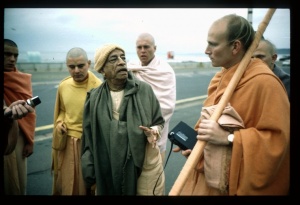CC Madhya 25.78 (1975): Difference between revisions
(Vanibot #0027: CCMirror - Mirror CC's 1996 edition to form a basis for 1975) |
(Vanibot #0020: VersionCompareLinker - added a link to the Version Compare feature) |
||
| Line 2: | Line 2: | ||
<div style="float:left">'''[[Sri Caitanya-caritamrta (1975)|Śrī Caitanya-caritāmṛta (1975)]] - [[CC Madhya (1975)|Madhya-līlā]] - [[CC Madhya 25 (1975)|Chapter 25: How All the Residents of Vārāṇasī Became Vaiṣṇavas]]'''</div> | <div style="float:left">'''[[Sri Caitanya-caritamrta (1975)|Śrī Caitanya-caritāmṛta (1975)]] - [[CC Madhya (1975)|Madhya-līlā]] - [[CC Madhya 25 (1975)|Chapter 25: How All the Residents of Vārāṇasī Became Vaiṣṇavas]]'''</div> | ||
<div style="float:right">[[File:Go-previous.png|link=CC Madhya 25.77 (1975)|Madhya-līlā 25.77]] '''[[CC Madhya 25.77 (1975)|Madhya-līlā 25.77]] - [[CC Madhya 25.79 (1975)|Madhya-līlā 25.79]]''' [[File:Go-next.png|link=CC Madhya 25.79 (1975)|Madhya-līlā 25.79]]</div> | <div style="float:right">[[File:Go-previous.png|link=CC Madhya 25.77 (1975)|Madhya-līlā 25.77]] '''[[CC Madhya 25.77 (1975)|Madhya-līlā 25.77]] - [[CC Madhya 25.79 (1975)|Madhya-līlā 25.79]]''' [[File:Go-next.png|link=CC Madhya 25.79 (1975)|Madhya-līlā 25.79]]</div> | ||
{{CompareVersions|CC|Madhya 25.78|CC 1975|CC 1996}} | |||
{{RandomImage}} | {{RandomImage}} | ||
==== TEXT 78 ==== | ==== TEXT 78 ==== | ||
<div class="verse"> | <div class="verse"> | ||
:prabhu kahe, | :prabhu kahe,-'viṣṇu' 'viṣṇu', āmi kṣudra jīva hīna | ||
:jīve | :jīve 'viṣṇu' māni-ei aparādha-cihna | ||
</div> | </div> | ||
| Line 25: | Line 24: | ||
<div class="translation"> | <div class="translation"> | ||
When Prakāśānanda Sarasvatī supported himself by quoting the verse from Śrīmad-Bhāgavatam, Śrī Caitanya Mahāprabhu immediately protested by uttering the holy name of Lord Viṣṇu. The Lord then presented Himself as a most fallen living entity, and He said, | When Prakāśānanda Sarasvatī supported himself by quoting the verse from Śrīmad-Bhāgavatam, Śrī Caitanya Mahāprabhu immediately protested by uttering the holy name of Lord Viṣṇu. The Lord then presented Himself as a most fallen living entity, and He said, "If someone accepts a fallen conditioned soul as Viṣṇu, Bhagavān, or an incarnation, he commits a great offense." | ||
</div> | </div> | ||
| Line 32: | Line 31: | ||
<div class="purport"> | <div class="purport"> | ||
Although Śrī Caitanya Mahāprabhu was Viṣṇu, the Supreme Personality of Godhead, to teach us a lesson | Although Śrī Caitanya Mahāprabhu was Viṣṇu, the Supreme Personality of Godhead, He nonetheless, to teach us a lesson, denied belonging to the Viṣṇu category. Unfortunately, there are many so-called Viṣṇu incarnations in this Age of Kali. People do not know that posing oneself as an incarnation is most offensive. People should not accept an ordinary man as an incarnation of God, for this also is a very great offense. | ||
</div> | </div> | ||
Latest revision as of 16:44, 27 January 2020

A.C. Bhaktivedanta Swami Prabhupada
TEXT 78
- prabhu kahe,-'viṣṇu' 'viṣṇu', āmi kṣudra jīva hīna
- jīve 'viṣṇu' māni-ei aparādha-cihna
SYNONYMS
prabhu kahe—Lord Śrī Caitanya Mahāprabhu said; viṣṇu viṣṇu—the holy name of Viṣṇu; āmi—I; kṣudra—infinitesimal; jīva—a living entity; hīna—bereft of all good qualities; jīve—such a low-grade living entity; viṣṇu māni—accepting as Lord Viṣṇu or the Personality of Godhead; ei aparādha-cihna—this is a great offense.
TRANSLATION
When Prakāśānanda Sarasvatī supported himself by quoting the verse from Śrīmad-Bhāgavatam, Śrī Caitanya Mahāprabhu immediately protested by uttering the holy name of Lord Viṣṇu. The Lord then presented Himself as a most fallen living entity, and He said, "If someone accepts a fallen conditioned soul as Viṣṇu, Bhagavān, or an incarnation, he commits a great offense."
PURPORT
Although Śrī Caitanya Mahāprabhu was Viṣṇu, the Supreme Personality of Godhead, He nonetheless, to teach us a lesson, denied belonging to the Viṣṇu category. Unfortunately, there are many so-called Viṣṇu incarnations in this Age of Kali. People do not know that posing oneself as an incarnation is most offensive. People should not accept an ordinary man as an incarnation of God, for this also is a very great offense.